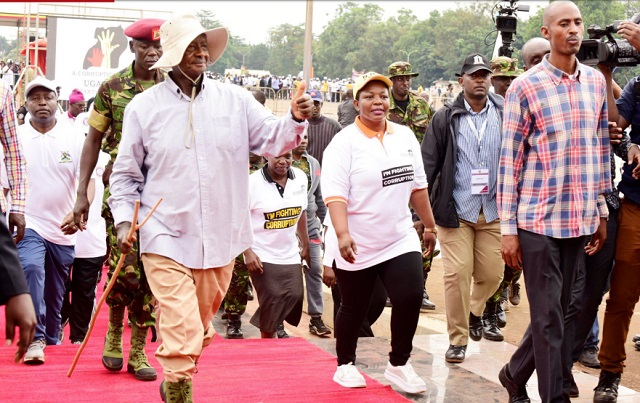
It’s not all doom and gloom
Kamapal, Uganda | RONALD MUSOKE | December 04 marked another key moment in President Yoweri Museveni’s protracted fight against corruption that has for a long time blighted Uganda’s development agenda.
Flanked by several high profile government officials, religious and civil society leaders, Museveni walked a stretch of about 4km alongside thousands of citizens to demonstrate government’s commitment in the war against the vice.
The president later addressed a rally at the Kololo Independence Grounds saying the “Corrupt people are parasites.”
“They are parasites because they get wealth which they did not earn,” he said. The president said it is the responsibility of political leaders to end the vice by organizing the economy in such a way that people meet their needs.
But sections of the Ugandan public were unimpressed and described the gesture as another public relations stunt. Moses Okemer, a motorcycle taxi (bodaboda) rider in Kampala told The Independent that he saw “nothing in Museveni’s corruption walk.”
“The government cannot fight corruption because many of those who walked are corrupt,” Okemer said, adding“It (corruption) could possibly end if they eliminate themselves from the system.”
The task of rooting corruption out of Uganda was not even lost on senior government leaders like Jacob Oulanyah, the Deputy Speaker of Parliament, who walked alongside President Museveni.
“Mr. President, we are all corrupt. We need to have a change of attitude,” Oulanyah said, before turning to address the rally, “Don’t wait to be anything else to start fighting corruption. It starts from where you are and what you do. Let us stop the pretence.”
Corruption the monster
Corruption has been described by observers of Ugandan society as one of the biggest challenges facing the country’s development aspirations of becoming a prosperous and perhaps welfare state by 2040.
“Corruption has become an accepted means of getting by in the country,” says a recent report by the Bertelsmann Stiftung Index, a German foundation that does research on socio-economic reform around the world. Indeed, advisories on corruption in the country are common when prospective investors are seeking strategic investment information on Uganda.
“The police, the judiciary and procurement are areas where corruption risks are very high and under-the-table cash payments are expected,” says a 2017 report on Uganda by GAN Integrity, a US-based technology company that manages corporate compliance programmes for over 140 global companies, “Corruption challenges are exacerbated by weak law enforcement, which fuels a culture of impunity.”
Interestingly, Uganda has one of the most robust anti-corruption legal frameworks on the continent such as the Anti-Corruption Act, the Penal Code, the Inspectorate of Government Act, 2002, the Public Finance Management Act 2015 and the Leadership Code Act 2002 yet the vice still persists.
“Nearly half of Ugandans perceive the judiciary as corrupt,” says the 2015 Global Corruption Barometer. “In 2015, nearly half of Ugandans who had come into contact with the courts in the previous 12 months indicated having paid a bribe.”
There are probably millions more accounts by Ugandans who have tried to access services in public institutions like hospitals, police and education facilities.
 The Independent Uganda: You get the Truth we Pay the Price
The Independent Uganda: You get the Truth we Pay the Price



